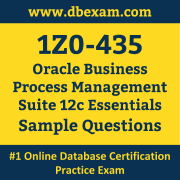01. Which two statements are correct about business indicators?
a) They can be captured at measurement marks.
b) Dimensions allow the user to capture numerical values.
c) All business indicators are captured at sampling points and a subset is captured at measurement marks.
d) Counters are used for interval start and interval stop measurements.
02. You are using the round trip simulation feature. What can you automatically create based upon actual process runtime data?
a) process model
b) simulation definition
c) simulation model
d) unit test
e) decision table business rule
03. Which two product features might a process analyst use the most in contrast to a process developer?
a) Process simulation
b) Business rules
c) Mediator services
d) Web Forms
e) BPM Studio
f) ADF forms
04. Which two steps are required to add a new user to an existing role for a BPM Suite application?
a) Add the new user in Business Process Workspace.
b) Add the new user in WebLogic Console.
c) Associate the new user with the role in WebLogic Console.
d) Associate the new user with the role in Business Process Workspace.
05. To establish the integration between BPM Suite and BAM 12c, you need to _____.
a) do nothing as they are integrated out-of-the-box
b) set the DisableProcessMetrics MBean setting to false on the SOA server
c) set the DisableProcessMetrics MBean setting to false on the BAM server
d) set the DisableMonitorExpress MBean setting to false on the SOA server
06. Which one of these components provides for a shared work environment for a BPM Suite 12c project where analysts use Process Composer and process developers use BPM Studio?
a) Oracle Enterprise Repository
b) Meta Data Services
c) Process Asset Manager
d) Apache Derby DB
07. Which three actions are available when using business rules for a case?
a) Activate activities.
b) Set an activity’s relevance.
c) Change a milestone deadline.
d) Change a required activity to an optional activity.
e) Modify case data.
08. You are analyzing the different methods available to manage the life cycle of the OWSM policies in your SOA/BPM environment.
Identify two statements that correctly describe OWSM policy attachments.
a) Although you can both attach and detach security policies in JDeveloper, you can detach them only in Enterprise Manager.
b) An application developer typical uses JDeveloper to create new security policies rather than select them from a prebuilt list.
c) When you use JDeveloper to associate a security policy with a web service, the policy is not really attached until application deployment.
d) OWSM policies can be attached and detached with WLST.
09. An ADF project created for a human task flow _____.
a) contains only one task flow for one human task
b) contains only on ADF form for one human task
c) typically contains several automatically generated forms
d) typically contains task flows and forms for more than one human task
10. Which two statements are true for decision table rules?
a) They can have multiple conditions, but share only one action.
b) They typically contain a set of rules that covers all combinations or where no two combinations conflict.
c) Both gap detection and conflict resolution cannot be turned off at the same time.
d) A priority can be set for an entire decision table.
 The Oracle Business Process Management Suite Essentials (1Z0-435) Sample Question Set is designed to help you prepare for the Oracle Business Process Management Suite 12c Certified Implementation Specialist (OCS) certification exam. To become familiar with the actual Oracle Certification exam environment, we suggest you try our Sample Oracle 1Z0-435 Certification Practice Exam.
The Oracle Business Process Management Suite Essentials (1Z0-435) Sample Question Set is designed to help you prepare for the Oracle Business Process Management Suite 12c Certified Implementation Specialist (OCS) certification exam. To become familiar with the actual Oracle Certification exam environment, we suggest you try our Sample Oracle 1Z0-435 Certification Practice Exam.